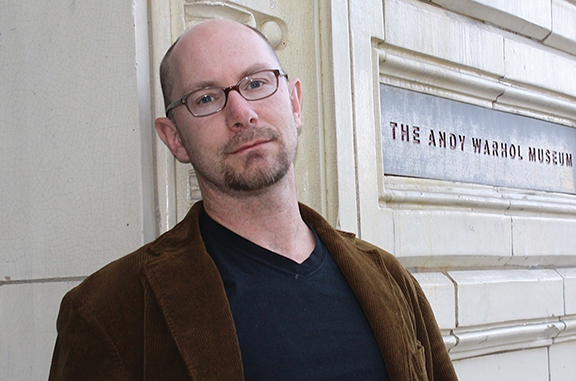
University doctoral candidate James Hesla
James Hesla will have a lot to juggle come September.
The university doctoral candidate is headed to Indonesia to research Balinese clown theater and traditional masked dance and drama after receiving a Fulbright grant for the 2013-14 academic year. While abroad, Hesla will study what he sees as the clown character’s ability to comment satirically on topical events and cultural institutions in a way that connects with the audience.
With this trip, Hesla will return to Indonesia, where he spent a year after graduating from the Cornish College of the Arts in 1991. There, he was an English as a second language teacher and watched a number of traditional performances that deepened his fascination with clown theater.
“I’ve always sort of been thinking about how I could return to Asia, and this seemed like the perfect opportunity to kind of dovetail my interest in clown theater, clowning and my interest in Asian performance,” Hesla said.
There are dozens of different performance genres in Indonesia, and in each, the stories generally center on the world of the kings and the gods, Hesla said. But present in most of the stories is a
comic character who represents the audience’s reality.
Leslie Brice, the coordinator of the National Scholarships Office, said she was excited about Hesla’s research topic because it was different from any the office’s staff had worked with before.
“It was a topic that sort of challenges assumptions that one may have, and it was interesting because it was at the intersection of performance art, history, politics,” Brice said. “So I think it really stood out for those reasons.”
Hesla was one of 12 students from this university to receive a Fulbright grant for the upcoming academic year, along with three recent university graduates. He was the only applicant from this university whose area of research connected to the theater department, and he said it was a shock to learn he had won.
“I had read a number of winning proposals of students who had applied in the past in fields like marine science and earth science and all these other sciences, and I thought, they’re gonna look at my proposal to [study] clown characters in Bali and they’re gonna say, … ‘No that’s ridiculous, that’s not important,’” he said.
But the importance of his research, Hesla said, is in seeing how clowning in Indonesia “resonates with the culture at large, how it is woven into and reflective of cultural and political social values.”
Hesla grew fascinated by clowning during his undergraduate years at the Seattle visual and performing arts college. Then, Cirque du Soleil was just beginning, and the New Vaudeville movement was sweeping through theater. The featured clowns generally didn’t wear makeup or traditional clown attire, and they worked off creating a personal relationship with the audience.
Hesla saw a Cirque du Soleil performance while at Cornish, and he became so enamored with the clowns that he watched the show a few more times just to see them. When he saw a video of a performance by Bill Irwin, a clown famous for his New Vaudeville acts, he was blown away.
“I just thought like, ‘That’s what I want to be when I grow up,’” Hesla said.
But once he realized “being a clown is not the most lucrative career trajectory,” he channeled his interest in other directions.
After spending a year in Indonesia, where he watched a number of traditional performances, he attended graduate school at the University of Hawaii in the mid-1990s and earned his master’s in fine arts in playwriting with a concentration in Asian theater.
Hesla’s experience in Indonesia and knowledge of the language combined with his previous research on clowning made his Fulbright application stand out, said Laurie Frederik Meer, Hesla’s dissertation adviser and a university theater professor.
“James had an advantage, I think, because he had a very strong historical and cultural understanding of Indonesian clowning and theater,” Frederik Meer said. “He knows the language already, and he also knows just what clowning is as a genre.”
To Hesla, the Fulbright is about the exchange of ideas. He said that when he returns to Indonesia at the end of the month, he wants to bring back interesting ideas about clown theater and its cultural importance and relevance. But what he hopes to take away from the trip, he said, is less concrete.
“I kind of don’t really have any expectations,” Hesla said. “I just want to be open to the experience and be as generous and engaged as I can, just as a human and as a scholar and an artist.”



